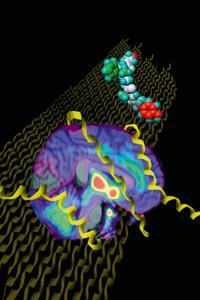How does placebo deceive the brain?

For many, placebos have a psychological effect, that is, if they are cured it is because the patient believes in it. That's it. However, researchers have shown that placebos have a physical influence on the brain. This effect has been verified using the PET technique to visualize brain activity.
In fact, in 2002, researchers at the Karolinska Institute found that blood flow increases in areas with numerous opioid receptors, providing volunteers with placebos that claim to relieve pain. That is, they have the same effect as the medications used to eliminate pain.
Now, the team of University of Michigan researcher JonKar Zubieta has analyzed the influence of placebos on opioid receptors. They have used a radioactive molecule that binds to loose opioid receptors, which
has allowed them to see how placebos act on receptors.
In the experiment they have used fourteen volunteers and have shown that with an injection that supposedly removes the pain, they do not really feel pain,
even if the injection is just a serum. It follows that pain-relieving molecules, opioids, are secreted by the brain when taking placebo. When they are associated with opioid receptors, the images do not show free receptors, as they are all united.
Buletina
Bidali zure helbide elektronikoa eta jaso asteroko buletina zure sarrera-ontzian











